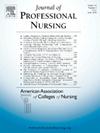A qualitative inquiry into stress and coping among baccalaureate students in preparation for entering the nursing workforce
IF 2.9
3区 医学
Q1 NURSING
引用次数: 0
Abstract
Background
Nursing is often synonymous with a high-pressure, fast-paced workplace environment. Similarly, nursing students experience high stress levels due to the demanding nature of academic and clinical responsibilities. These stressors can significantly impact students' mental and physical health, leading to issues such as insomnia, depression, and anxiety. Understanding how nursing students cope with stress is crucial for developing supportive interventions and preparing them to enter the nursing workforce.
Purpose
This study aims to explore the lived experiences of nursing students regarding stress and coping mechanisms.
Methods
The design of this study was a qualitative interpretive phenomenological inquiry. An online platform with open-ended prompts was used to elicit data from a purposive sample of nursing students (n = 12) in the Western United States. Data were inductively analyzed. Emerging themes were then further contextualized for application using Lazarus and Folkman's Stress and Coping Theory.
Results
Five major themes emerged from the data: (1) Barriers to Prioritizing Wellness, (2) Sleep Issues, (3) Mental Health Concerns, (4) Intrinsic Coping Mechanisms, and (5) Extrinsic Institution-Based Resources. Findings suggest nursing students struggle to balance academic and professional responsibilities with personal health and well-being. Self-initiated coping mechanisms, such as volunteering, meditation, and seeking support from school resources, were identified. However, effectiveness varied among students.
Conclusions
Stress affects nursing students' well-being, with inconsistent coping effectiveness. Balancing academics and personal wellness can be challenging, and without institutional support, novice nurses may enter the workforce unprepared. Nursing educators must enhance teaching and resources to equip students with effective coping strategies and support access for career longevity.

在准备进入护理队伍的本科学生的压力和应对的定性调查
护理工作通常是高压、快节奏的工作环境的代名词。同样,由于学术和临床责任的要求,护理专业的学生承受着很高的压力。这些压力源会严重影响学生的身心健康,导致失眠、抑郁和焦虑等问题。了解护理专业学生如何应对压力对于制定支持性干预措施和为他们进入护理队伍做好准备至关重要。目的探讨护生的生活压力体验及其应对机制。方法本研究设计为定性解释现象学探究。一个带有开放式提示的在线平台被用来从美国西部的护理学生(n = 12)的有目的样本中获取数据。对数据进行归纳分析。然后将新出现的主题进一步应用于Lazarus和Folkman的压力和应对理论。结果从数据中得出五大主题:(1)优先考虑健康的障碍,(2)睡眠问题,(3)心理健康问题,(4)内在应对机制,(5)外在机构资源。研究结果表明,护理专业的学生很难在学术和专业责任与个人健康和幸福之间取得平衡。自我发起的应对机制,如志愿服务,冥想和寻求学校资源的支持,被确定。然而,学生之间的效果各不相同。结论压力影响护生的幸福感,其应对效果不一致。平衡学业和个人健康可能具有挑战性,如果没有机构的支持,新手护士可能会毫无准备地进入劳动力市场。护理教育工作者必须加强教学和资源,使学生掌握有效的应对策略,并支持获得职业寿命。
本文章由计算机程序翻译,如有差异,请以英文原文为准。
求助全文
约1分钟内获得全文
求助全文
来源期刊
CiteScore
4.80
自引率
8.00%
发文量
153
审稿时长
52 days
期刊介绍:
The Journal will accept articles that focus on baccalaureate and higher degree nursing education, educational research, policy related to education, and education and practice partnerships. Reports of original work, research, reviews, insightful descriptions, and policy papers focusing on baccalaureate and graduate nursing education will be published.

 求助内容:
求助内容: 应助结果提醒方式:
应助结果提醒方式:


